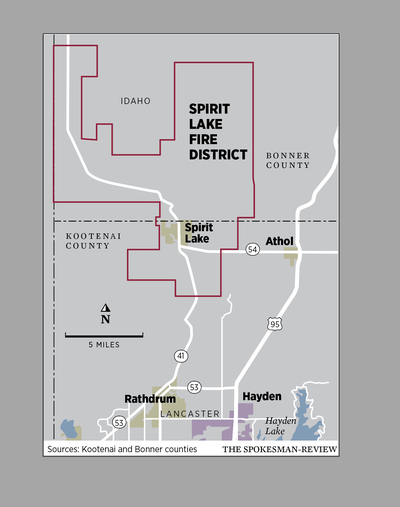Spirit Lake Fire Protection District seeks levy vote to improve service

The Spirit Lake Fire Protection District is asking voters to approve a levy override on the November ballot for the first time since the district was created in 1978.
The district covers 120 square miles in Kootenai and Bonner counties, including the communities of Spirit Lake, Blanchard, Stoneridge, Hoodoo Valley and Spirit Valley.
Fire districts are only allowed to raise the amount of property taxes they collect by 3% annually without a vote of the people. In recent years, with the huge population growth in the area, the district has struggled to make ends meet, said Fire Chief Debbie Carpenter. “We’ve had to make a lot of cuts in order to survive the rapidly dropping levy rate,” she said.
The district collected $127.34 per $100,000 in taxable assessed home value in 2016 and that has dropped to the $49.46 per $100,000 that is currently collected.
As new construction takes place, the amount the district is allowed to collect does not change. The amount is just spread over a larger number of homes, which means that the levy rate each home pays drops. By law fire districts are allowed to collect a maximum of $240 per $100,000 in taxable assessed home value. Spirit Lake is seeking to increase the current $49 to $74 per $100,000 in taxable assessed home value, still far from the allowed maximum.
“We’re essentially running on a 20% budget right now,” Carpenter said. “It would bring us to about 30% of the maximum. It’s pretty low, but it would be life -changing for a small district like ours.”
The district currently operates with nine paid firefighters, which allows three firefighters on duty per shift. The levy override would pay for the addition of three firefighters, bringing shift staffing up to four firefighters. That would allow crews to either respond to two minor calls at once or bring two apparatus to a larger call, such as a fire truck and a water tender. That is not possible with only three firefighters on duty at one time, Carpenter said.
“We can actually take two rigs to a call, reducing the time it takes to get on scene,” she said.
All the district’s firefighters work out of the district’s main station in Spirit Lake, staffing it 24/7. The district also has two smaller stations, one in Blanchard and one north of Spirit Lake, that are not staffed and house the district’s reserve equipment.
In 2016, the district responded to 721 calls. That rose to 1,026 in 2023. “Our call volume is increasing exponentially while our budget is staying flat,” Carpenter said. “Just this last weekend on Saturday we ran on seven calls. We were not available for service for another call the majority of the 24-hour day. Ten years ago, we would have made two calls just on a random Saturday in October.”
The levy would also help the district establish a vehicle and equipment replacement plan to get rid of old, outdated equipment such as turnout gear and communications equipment.
The district began collecting development impact fees in 2022, but those funds cannot be used for personnel or other overhead costs. Impact fees can only be used to fund capital improvements such as new trucks or facilities and the district has used the money collected so far to buy a new fire chief vehicle and a fire engine.
The district is asking for a permanent levy override, which requires 66.7% approval from voters to pass, because the extra staff and equipment replacement will be an ongoing expense.
“Our preference is to be transparent in that we need this levy for staffing,” she said. “A permanent levy will fund those firefighters for the foreseeable future.”
Carpenter said she’s been meeting with community groups and hosting open houses to explain the need for a levy override. She said many people don’t know how the levy system works but are receptive to approving the levy once it is explained.
“It’s a confusing system, even for our residents,” she said. “We’ve been hearing overwhelmingly positive feedback on supporting the levy once they know how it works.”
Carpenter said the district was very careful to calculate only what is needed to keep costs low for taxpayers.
“This is not just a request for more money,” she said. “This is a request to expand our services to better meet the needs of our growing community.”